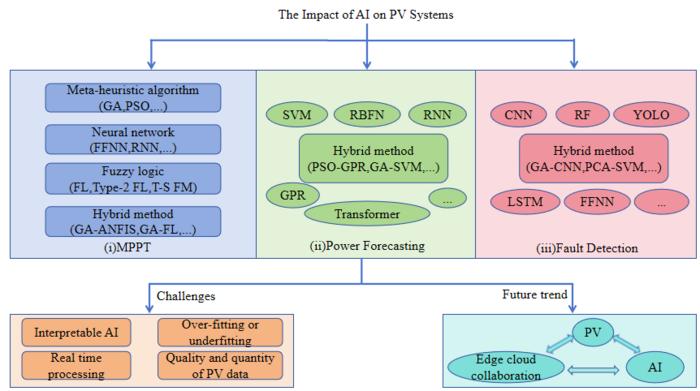Artificial intelligence is poised to bring photovoltaic systems into a new era through revolutionary improvements in efficiency, reliability, and predictability of solar power generation.

Credit: Xiaoyun Tian, Beijing University of Technology
Artificial intelligence is poised to bring photovoltaic systems into a new era through revolutionary improvements in efficiency, reliability, and predictability of solar power generation.
In their paper published on May 8 in CAAI Artificial Intelligence Research, a research team from Chinese and Malaysian universities explored the impact of artificial intelligence (AI) technology on photovoltaic (PV) power generation systems and their applications from a global perspective.
“The overall message is an optimistic outlook on how AI can lead to more sustainable and efficient energy solutions,” said Xiaoyun Tian from Beijing University of Technology. “By improving the efficiency and deployment of renewable energy sources through AI, there is significant potential to reduce global carbon emissions and to make clean energy more accessible and reliable for a broader population.”
The team, which included researchers from Beijing University of Technology, Chinese Academy of Sciences, Hebei University, and the Universiti Tunku Abdul Rahman, focused their review on pivotal applications of AI in maximum power point tracking, power forecasting and fault detection within PV systems.
The maximum power point (MPP) refers to the specific operating juncture where a PV cell or an entire PV array yields its peak power output under prevailing illumination conditions. Tracking and exploiting the point of maximum power, mainly by adjusting the operating point of the PV array to maximize output power, is an important problem in solar PV systems. Traditional methods are plagued by defects, resulting in issues like reduced efficiency, wear on hardware and suboptimal performance during sudden weather changes.
The researchers reviewed publications demonstrating how AI techniques can achieve high performance in solving the MPP tracking problem. They compiled publication methods that presented both single and hybrid AI methods to solve the tracking problem, exploring the advantages and disadvantages of each approach.
The team reviewed publications that presented AI algorithms applied in PV power forecasting and defect detection technologies. Power forecasting, which refers to predicting the production of PV power over a certain incoming period, is crucial for PV grid integration because the share of solar energy in the mix increases every year as well as the PV generation has intermittent nature that may impact the grid stability. Fault detection in PV systems can detect and locate various types of failures in the PV system, such as environmental changes, panel damage and wiring failures. For large-scale PV systems, traditional manual inspection is almost impossible and passive. AI algorithms can step in where manual inspection falls short, identifying deviations from normal operating conditions that may indicate faults or anomalies proactively.
The research team combed through the literature that presented single and hybrid AI methods to solve both problems. By comparing AI-driven techniques, the team explored and presented advantages and disadvantages of each approach.
While integrating AI technology optimizes and improves the operational efficiency of PV systems, new challenges continue to arise. These challenges are driven by issues such as revised standards for achieving carbon neutrality, interdisciplinary cooperation, and emerging smart grids.
The researchers highlighted some emerging challenges and the need for advanced solutions in AI, such as transfer learning, few-shot learning and edge computing.
According to the paper’s authors, the next steps should focus on further research directed towards advancing AI techniques that target the unique challenges of PV systems; practical implementation of AI solutions into existing PV infrastructure on a wider scale; scaling up successful AI integration; developing supportive policy frameworks that encourage the use of AI in renewable energy; increasing awareness about the benefits of AI in enhancing PV system efficiencies; and ultimately aligning these technological advancements with global sustainability targets.
“AI-driven techniques are essential for the future development and widespread adoption of solar-energy technologies globally,” Tian said.
The research was supported by the National Key R&D Program of China and Fundamental Research Grant Scheme of Malaysia. The grants are parked under China-Malaysia Intergovernmental Science, Technology and Innovation Cooperative Program 2023.
Other contributors include Jiaming Hu, Kang Wang and Dachuan Xu from Beijing University of Technology; Boon-Han Lim from Universiti Tunku Abdul Rahman; Feng Zhang from Hebei University; and Yong Zhang from Shenzhen Institute of Advanced Technology, the Chinese Academy of Science.
About CAAI Artificial Intelligence Research
CAAI Artificial Intelligence Research (CAAI AIR) is an Open Access, peer-reviewed scholarly journal, published by Tsinghua University Press, released exclusively on SciOpen. CAAI AIR aims to publish the state-of-the-art achievements in the field of artificial intelligence and its applications, including knowledge intelligence, perceptual intelligence, machine learning, behavioral intelligence, brain and cognition, AI chips and applications, etc. Original research and review articles on but not limited to the above topics are welcome. The journal is completely Open Access with no article processing fees for authors.
About SciOpen
SciOpen is a professional open access resource for discovery of scientific and technical content published by the Tsinghua University Press and its publishing partners, providing the scholarly publishing community with innovative technology and market-leading capabilities. SciOpen provides end-to-end services across manuscript submission, peer review, content hosting, analytics, and identity management and expert advice to ensure each journal’s development by offering a range of options across all functions as Journal Layout, Production Services, Editorial Services, Marketing and Promotions, Online Functionality, etc. By digitalizing the publishing process, SciOpen widens the reach, deepens the impact, and accelerates the exchange of ideas.
Journal
CAAI Artificial Intelligence Research
Article Title
A Comprehensive Review of Artificial Intelligence Applications in the Photovoltaic Systems
Article Publication Date
8-May-2024



